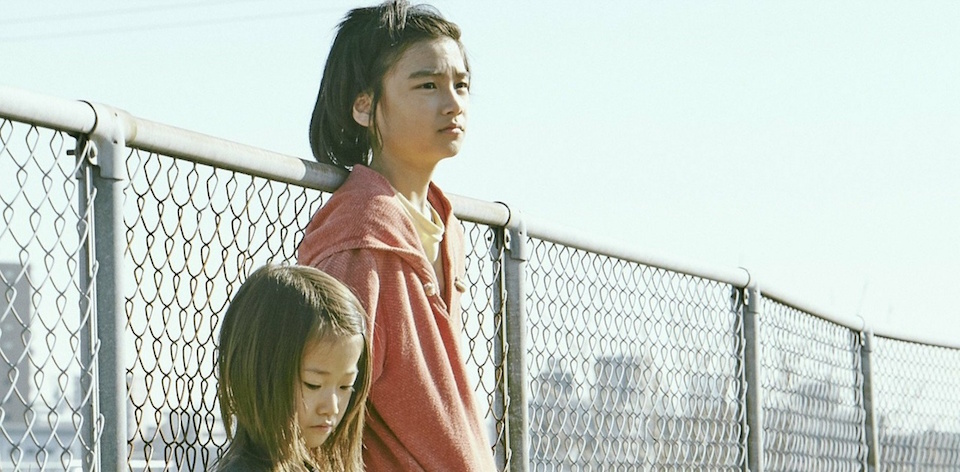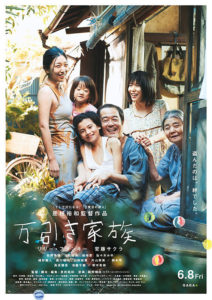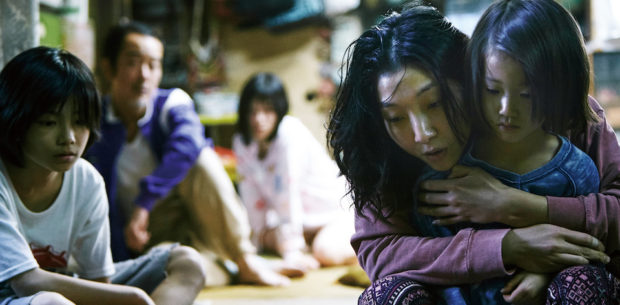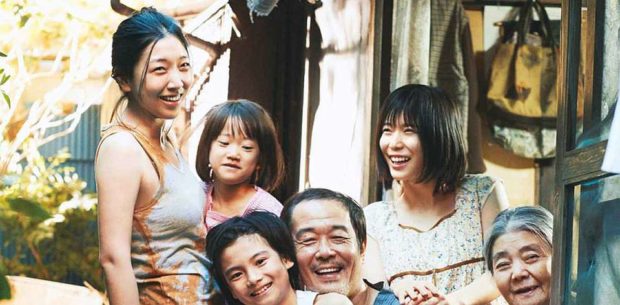Family is a recurring theme in the work of Hirokazu Kore-eda. With his latest feature, his first to win the Palme d’Or at Cannes, Kore-eda extends that notion of collective relationships to a wider societal family. One of the filmmaker’s most socially conscience films to date, it might also be one of his most universal.
Within the heart of Tokyo, Osamu (Lily Franky) is a day labourer who lives with his wife Nobuyo (Sakura Ando) and her younger sister Aki (Mayu Matsuoka) in poverty. Relying on his grandmother’s (Kirin Kiki) pension, his bond with son Shota (Kairi Jyo) is through shoplifting. When Osamu and Shota find little girl Yuri (Miyu Sasaki) out in the cold, they bring her home and change the family dynamic.
With SHOPLIFTERS (万引き家族), Kore-eda draws a direct line through to a conversation about nature versus nurture he explored in Like Father, Like Son. In that film, a hospital mixup saw two sets of parents decide whether to keep the child they have known for the last six years, or to reunite with their biological children. Here he explores of the dichotomy of loneliness versus family, acknowledging that a messy clan that you choose yourself beats the former.
Yuri’s introduction to the family is only briefly seen as kidnapping. The family is so encased in their own bubble that there’s a self-fulfilling justification for everything. Living on top of each other in a hoarder’s paradise, the kids are left to fend for themselves (as with Nobody Knows), Grandma extorts money from relatives, and Aki is a soft-core hostess in a bar. Sometimes hilarious, and always heartwarming, the odd unit is bound by a positive form a love Yuri has not experienced before.
Kore-eda has assembled one of his strongest casts to date, with family and new faces alike pulling in award-worthy performances. The affable and always reliable Franky as the misguided patriarch plays perfectly off the amazing Sakura Ando. A scene in which the two lay about in casual nakedness is textbook Kore-eda naturalism.
Some of the best character moments are between Aki and the woman she calls Grandma. After all, it wouldn’t be a great Japanese movie without the formidable Kirin Kiki delivering lines like “Just try preying on me.”. Aki also has some heartbreaking moments in a hostess bar with a mute client, showing that her essential goodness (along with the rest of the family) extends beyond the six people in a cramped apartment.
Warmly shot by Kondo Ryuto, the film keeps the truth of how they are all related as a mystery for the most part, but their intimacy is tangible. When the film makes a rapid a tonal shift in the last act, more reminiscent of Kore-eda’s The Third Murder, it’s not an unexpected one. We realise that we have all been holding our breaths as an audience, waiting for the inevitability of this fragile ecosystem to fall apart. Put simply, this is another masterpiece from the king of intimate family dramas.
 2018 | Japan | DIR: Hirokazu Kore-eda | WRITER: Hirokazu Kore-eda | CAST: Lily Franky, Sakura Ando, Mayu Matsuoka, Kirin Kiki | DISTRIBUTOR: Rialto Distribution, Sydney Film Festival (AUS) | RUNNING TIME: 124 minutes | RELEASE DATE: 13 June 2018 (SFF), 8 June 2018 (Japan)
2018 | Japan | DIR: Hirokazu Kore-eda | WRITER: Hirokazu Kore-eda | CAST: Lily Franky, Sakura Ando, Mayu Matsuoka, Kirin Kiki | DISTRIBUTOR: Rialto Distribution, Sydney Film Festival (AUS) | RUNNING TIME: 124 minutes | RELEASE DATE: 13 June 2018 (SFF), 8 June 2018 (Japan)







